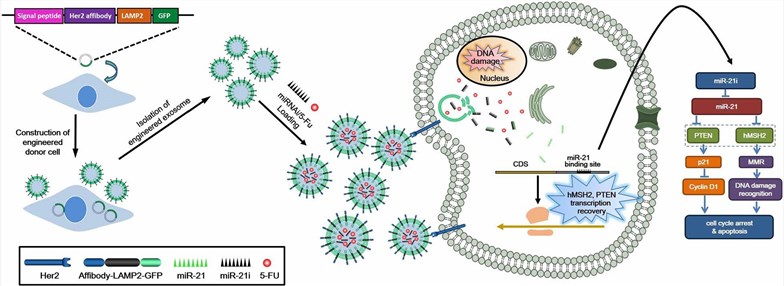Colorectal Cancer-Targeted Exosome Modification Service
Overview Services Construction and Effect FAQs
Overview
Finding out the specific target of colorectal cancer (CC) and killing CC cells is a precise and efficient treatment method. To achieve precise treatment and reduce the toxic side effects of the treatment process on normal cells, researchers have been looking for an optimal drug delivery carrier.
CC-Targeted Exosome Modification Service
Exosomes are natural nanobiological carriers with stability and membrane permeability. Because exosomes can recognize specific cells, delivery of therapeutic drugs via exosomes has better efficacy and fewer off-target effects than other biological carriers, such as liposomes. Therefore, exosomes can be efficiently transported and transferred, such as drugs, miRNAs, small interfering RNAs (siRNAs), short hairpins, and transfer RNAs (shRNAs), etc., for the treatment of CC. Furthermore, improving the specificity of exosome targeting and being absorbed by CC cells by exosome display technology is a very promising strategy. Creative Biolabs can provide technologies such as exosome display-based targeted delivery, cargo loading into exosomes, exosome profiling, etc., to assist global customers in the therapeutic research of CC.
 Fig.1 Engineered exosomes-based nanocarrier for 5-FU and miR-21i simultaneously deliver to human colon cancer cells for enhancing chemotherapy efficacy.1,2
Fig.1 Engineered exosomes-based nanocarrier for 5-FU and miR-21i simultaneously deliver to human colon cancer cells for enhancing chemotherapy efficacy.1,2
Construction and Therapeutic Effect of Engineered Exosomes Targeting Colon Cancer
-
AS1411 is a nucleic acid aptamer targeting tumor cells with high nucleolin expression. Related studies have shown that AS1411, as a cell uptake enhancer, can precisely target tumor cells. Therefore, in the research stage, AS1411 is often used for surface modification of exosomes to target cancer cells. Researchers have combined AS1411 with amine groups on the surface of exosomes to construct engineered exosomes (AS1411-Exo) that can target CC. Doxorubicin (DOX)-loaded AS1411-Exo can be efficiently targeted to CC cells in vitro and in vivo, significantly inhibiting tumor growth.
-
Since Mucin 1 (MUC1) is a glycoprotein highly expressed on the cell membrane of CC, it is an ideal CC target molecule. Therefore, the researchers screened a 5TR1 aptamer with a high binding force to MUC1 by systematic evolution of ligands by exponential enrichment (SELEX). 5TR1 aptamer-modified exosomes (5TR1-Exo) increased the efficiency of DOX uptake by CC cells and significantly inhibited tumor growth in a mouse model.
-
Human epidermal growth factor receptor 2 (HER2) is a membrane protein highly expressed in CC, which is associated with the degree of malignancy and poor prognosis of CC. Therefore, HER2 is a very promising target for drug-loaded exosomes. Combination delivery of anticancer drugs, including 5-Fluorouracil and miR-21 inhibitor, with HER2a-Exo, could effectively reverse the resistance of CC cells to 5-Fluorouracil and significantly inhibit the progression of CC.
Creative Biolabs can provide overall services from experimental design, exosome isolation, exosome -NGS, and exosome labeling to in vivo and in vitro function verification. We provide you with including but not limited to AS1411-Exo, 5TR1-Exo, and HER2a-Exo, to assist your CC precision treatment research. Please contact us with your ideas to develop the best overall solution for you.
References
-
Liang, G.; et al. Engineered exosomes for targeted co-delivery of miR-21 inhibitor and chemotherapeutics to reverse drug resistance in colon cancer. Journal of Nanobiotechnology. 2020, 18(1):10.
-
under Open Access license CC BY 4.0, without modification.
FAQs
How are exosomes modified to target colorectal cancer cells?
Exosomes can be modified for colorectal cancer targeting through various approaches, including surface engineering with colorectal cancer-specific targeting ligands or antibodies, loading with therapeutic cargo for colorectal cancer treatment, or using colorectal cancer cell-derived exosomes for drug delivery. These modifications improve colorectal cancer-specific delivery and therapeutic effectiveness.
What types of colorectal cancer can be targeted using this service?
Colorectal cancer-targeted exosome modification can be applied to various subtypes of colorectal cancer, including adenocarcinoma, mucinous carcinoma, and signet ring cell carcinoma. By tailoring exosomes to colorectal cancer-specific markers or microenvironments, targeted therapies can be developed for different colorectal cancer subtypes.
How are the specificity and efficacy of colorectal cancer-targeted exosome modifications validated?
Specificity and efficacy of colorectal cancer-targeted exosome modifications are validated through in vitro and in vivo studies. These include cellular uptake assays using colorectal cancer cell lines, biodistribution studies in animal models, therapeutic efficacy assessments, and safety evaluations in colorectal cancer models.
Can colorectal cancer-targeted exosome modification services be customized for different therapeutic approaches?
Yes, our services offer customization options to tailor colorectal cancer-targeted exosome modifications for various therapeutic approaches, including chemotherapy, targeted therapy, immunotherapy, and RNA-based therapeutics. We collaborate with clients to design and optimize strategies based on specific colorectal cancer targets.
How can colorectal cancer-targeted exosome modification services advance drug development for colorectal cancer treatment?
By enabling precise targeting of therapeutic cargo to colorectal cancer cells or tissues, colorectal cancer-targeted exosome modification services enhance the efficacy, safety, and specificity of drug candidates for colorectal cancer treatment. This approach holds promise for developing targeted therapies with improved clinical outcomes and reduced side effects in colorectal cancer patients.
For Research Use Only. Cannot be used by patients.
Related Services:

 Fig.1 Engineered exosomes-based nanocarrier for 5-FU and miR-21i simultaneously deliver to human colon cancer cells for enhancing chemotherapy efficacy.1,2
Fig.1 Engineered exosomes-based nanocarrier for 5-FU and miR-21i simultaneously deliver to human colon cancer cells for enhancing chemotherapy efficacy.1,2








